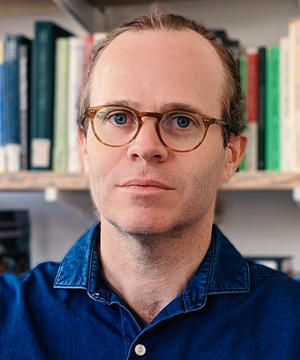
- chsims@ucsd.edu
- (858) 246-0739
-
9500 Gilman Dr
Office: MCC 207
La Jolla , California 92093
Associate Professor and Affiliated Faculty in Science Studies, Ethnic Studies, and Design Lab

Christo Sims is Associate Professor of Communication at the University of California, San Diego. He also holds affiliations with Urban Studies, Science Studies, Ethnic Studies, and the Design Lab at UCSD. During the 2020-21 academic year, he was an in-residence member of the School of Social Science at the Institute for Advanced Study in Princeton.
A scholar of technological change, social inequality, and social practice, Sims has authored award-winning books and acclaimed articles at the interfaces of science and technology studies, sociology, anthropology, communication & media studies, and urban studies. Trained as a historically attuned ethnographer, his current book project focuses on how regional economies centered on knowledge work are attempting to sustain economic growth in the face of ecological limits and severe social inequalities. Using Silicon Valley as a case study, the project traces how processes of industrial development affect ecological conditions and the spatialization of inequalities in the San Francisco Bay Area. Previously, he studied how social reformers in the U.S. frequently turn to new technologies to fix educational institutions and uproot entrenched inequalities despite decades of disappointing results.
He first solo-authored book, Disruptive Fixation: School Reform and the Pitfalls of Techno-Idealism (Princeton), won the Best Book Award from the Communication, Information Technology, and Media Sociology section of the American Sociological Association. His most recent work was published in the acclaimed journal Public Culture, and he is currently co-editing a special issue on Science and the State with members of 2020-21 class of the School of Social Science at the Institute for Advanced Study. Sims is also a member of the Social Science Research Council’s Just Tech Network.
Sims teaches courses on practice theory, the climate crisis, social inequality, social movements, moral economies, and the ethics and politics of technology design. Having worked as both an ethnographer and a designer, Sims is a founding member of both the Studio for Ethnographic Design at UCSD and the University of California Collaboratory for Ethnographic Design. He is also a core member of the Nature, Space, and Politics research group.
Raised in rural Northern California, Sims is a Phi Beta Kappa graduate of Bowdoin College. He earned his PhD from the University of California, Berkeley in 2012.
BOOKS
Disruptive Fixation: School Reform and the Pitfalls of Techno-Idealism. 2017. Princeton, NJ: Princeton University Press. (Princeton Studies in Culture and Technology
Tom Boellstorff and Bill Maurer, Series Editors)
Digital Media and Technology in Afterschool Programs, Libraries, and Museums. 2011. The John D. and Catherine T. MacArthur Foundation Reports on Digital Media and Learning. Cambridge, MA: MIT Press. (with Becky Herr-Stephenson, Diana Rhoten, and Dan Perkel)
Hanging Out, Messing Around, and Geeking Out: Living and Learning with New Media. 2010. Cambridge: MIT Press. (with Mizuko Ito, Sonja Baumer, Matteo Bittanti, danah boyd, Rachel Cody, Becky Herr-Stephenson, Heather A. Horst, Patricia G. Lange, Dilan Mahendran, Katynka Martinez, C.J. Pascoe, Dan Perkel, Laura Robinson, and Lisa Tripp)
SELECT ARTICLES & ESSAYS
My teaching focuses on the social, political, and ecological aspects of technology and design. In all my classes, I direct attention toward the often quotidian ways in which persons, designed artifacts and environments, and historical structures make, sustain, and transform each other. Since coming to UCSD, I have developed and taught the following courses: undergraduate and graduate courses on “situated practices” (core theory classes required of all undergraduate majors and PhD students), intermediate and advanced undergraduate studio courses on critical design (developed with my colleague Lilly Irani), an undergraduate course on media technologies and social movements, an undergraduate seminar that uses speculative design to explore futures for public universities, and graduate practicums on intellectual craftwork and ethnographic practice.